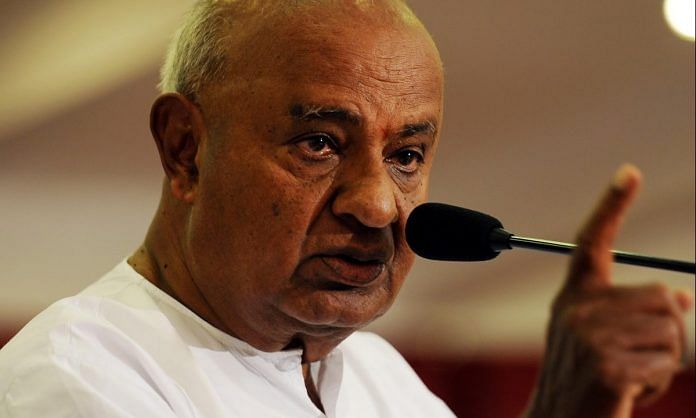Deve Gowda says India has always made an impact on the global stage and Modi should not claim to be the only man behind the country’s rise.
Bengaluru: Prime Minister Narendra Modi’s address at the World Economic Forum (WEF) in Davos may have made headlines and drawn praise but the last Indian prime minister to attend the global conference in the Swiss ski resort town is not too impressed.
In fact, H.D. Deve Gowda is quite piqued with the prime minister for what he views as Modi’s bid to appropriate all the credit for India’s progress.
Addressing the plenary session of WEF Tuesday, Modi said that when the last Indian prime minister visited Davos in 1997, the country’s GDP was just $400 billion. It was now six times that and India’s foreign exchange reserves are equal to its 1997 GDP.
“When I was at the WEF, the general feeling about our country was that it was very corrupt. I worked towards changing that image,” Gowda, who led a 13-party coalition government for 10 months, told ThePrint in an interview.
“Modi should realise that the base was prepared by previous governments. He should not forget that starting from Nehru, all prime ministers have contributed to this country and he definitely should not say he is ‘ the only man’.”
“India as a country has always made high impact. We will never let our country deteriorate. That is because our democratic system is so strong, it is not because of Modi,” Gowda, 84, said referring to Modi’s remarks in his Davos speech that India is starting a fresh journey towards a modern tax regime that is transparent, stable and predictable.
Gowda had attended WEF even as the chief minister of Karnataka in 1996, seeking to woo investors to Bangalore which had begun to emerge as India’s tech hub. But the Indian economy faced challenging conditions then in the years after Prime Minister P.V. Narasimha Rao had launched economic reforms.
“The general impression across the world was that India was corrupt, despite that I told the people there, come to my home state in Karnataka and you will not find a single instance of corruption there,” Gowda said recalling his visit to Davos as chief minister.
“I have taken some tough decisions in my state and that will show you how things have changed. I had brought several reforms in land, power, single-window system to clear pending cases.”
Gowda said that as prime minister he had sought to bring the office of the PM under the Lokpal bill to fight corruption and make the government more accountable. This, he said, had impressed foreign investors and gave them confidence to invest in India.
“Mine was a 13-party coalition government and so naturally there was a need for consensus. We did not have a full mandate like Modi has today. He can speak volumes, but I had to take all the 13 parties into confidence and at the same time improve the economic conditions,” Gowda said.
Has Modi got the timing of his visit to Davos wrong considering the Indian economy is struggling to recover from a slump? Gowda said he did not want to jump to any conclusions and wants to see “the benefits he is going to get for the country”.






